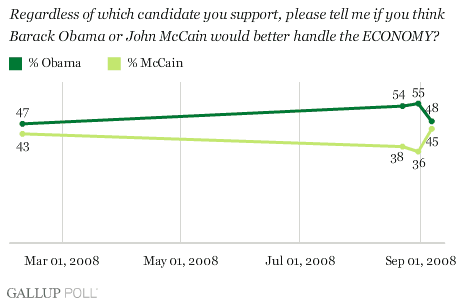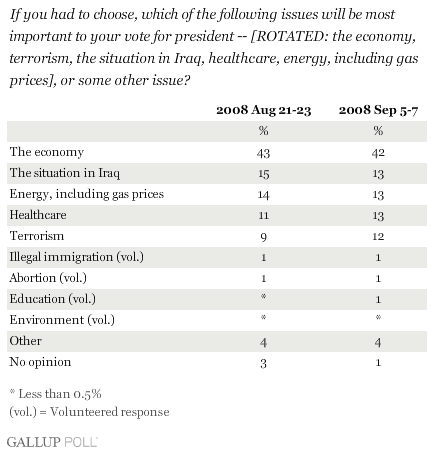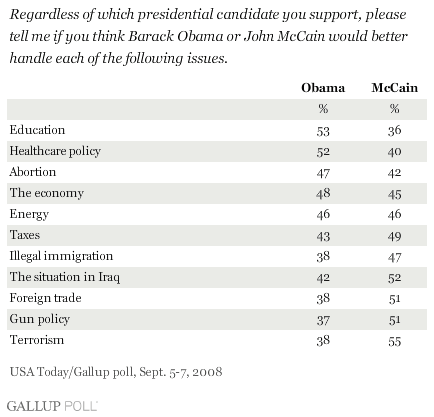PRINCETON, NJ -- In the Sept. 5-7 USA Today/Gallup poll, 48% of Americans say Barack Obama can better handle the economy, while 45% choose John McCain. This marks a significant gain by McCain; just before the Democratic National Convention in late August, Obama had a 16-point margin over McCain on the economy.

This type of improved positioning on McCain's part is not unexpected. Candidates generally enjoy an overall "bounce" in the horse race after their conventions, and concomitantly gain ground on specific issues and characteristics as well.
It's fair to say both candidates will continue to focus heavily on the economy between now and the election. That, coupled with the possibility that some of McCain's convention-related gains will dissipate, suggests there could be further change in this measure in the weeks ahead.
It's a critically important issue. In this poll, voters overwhelmingly choose the economy as the most important issue they will take into account in their vote for president.

The positioning of the candidates on 10 other issues tested in the Sept. 5-7 poll is displayed on the accompanying chart.

Obama has significant strength on two domestic issues: education and healthcare policy.
McCain, on the other hand, has significant strength on five issues, mostly dealing with international matters: terrorism, gun policy, foreign trade, the situation in Iraq, and illegal immigration.
These strengths are generally representative of Obama's and McCain's positioning throughout the campaign, and to a degree are similar to broad Democratic versus Republican strengths in previous elections. Democrats typically have the advantage on domestic issues, while Republicans do better on international issues, and, in particular since 9/11, on the issue of terrorism.
Gallup has not previously asked Americans to choose between the two candidates on gun policy. In this poll, at any rate, McCain wins big on the issue. As has become widely known, Sarah Palin, McCain's vice-presidential nominee, is a hunter and a member of the National Rifle Association. Whether this has affected the public's views of the candidates on this issue is unknown.
Similarly, this is the first time respondents have been asked to choose between the two candidates on abortion. Obama has a slight edge on the issue, as seen in the accompanying table. Palin's strong pro-life position has become widely known since her selection by McCain, particularly in light of the fact that she recently gave birth to a Down syndrome baby (whose condition Palin knew during her pregnancy) and that her daughter is pregnant and electing to have the baby (and to marry the father). Americans at this point in time tilt pro-choice in their orientation, so Obama's slight advantage on abortion is perhaps not surprising. But again, it is not possible to determine what impact, if any, McCain's selection of Palin as his running mate may have had on these perceptions.
Survey Methods
Results are based on telephone interviews with 1,022 national adults, aged 18 and older, conducted Sept. 5-7, 2008. For results based on the total sample of national adults, one can say with 95% confidence that the maximum margin of sampling error is ±3 percentage points.
Interviews are conducted with respondents on land-line telephones (for respondents with a land-line telephone) and cellular phones (for respondents who are cell-phone only).
In addition to sampling error, question wording and practical difficulties in conducting surveys can introduce error or bias into the findings of public opinion polls.
To provide feedback or suggestions about how to improve Gallup.com, please e-mail feedback@gallup.com.
